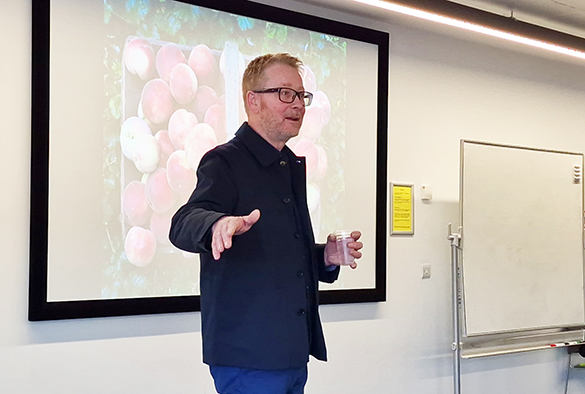
Mark Diacono shared his experience and knowledge on how growing your own food can increase connectedness on different levels, during the ‘Vegetal Thinking: Managing Plants for Wellbeing’ seminar.
On January 18, the Management School’s Centre for Organisational and Employee Wellbeing welcomed Mark Diacono from Otter Farm, as a keynote speaker in the ‘Vegetal Thinking: Managing Plants for Wellbeing’ seminar.
Mark delivered an insightful presentation on the relationship between gardening, food, diet and wellbeing, based on his experience starting out as an amateur gardener, after eating his first mulberry, to becoming a recognised food writer, and owning his own farm in East Devon.
He focused on how wellbeing can be positively influenced by growing your own food, as it helps increase connectivity on various levels:
“I really feel that an element of wellbeing is feeling some kind of connectivity, and the interesting thing about growing your own food is, that it’s very solitary.
“It’s you doing your own thing, you are often not in contact with everybody else, but you can be.
“The way that growing a bit of my own food makes that happen is it gives me connectivity to others, to ourselves, through time, it has made me more positive – I think there is an energising and engaging message you can give to yourself – but I also felt connected to the bigger picture.”
We had the pleasure of enjoying a visit from @MarkDiacono, as part of the ‘Vegetal Thinking: Managing Plants for Wellbeing’ seminar, by the Centre of Organisational and Employee Wellbeing.
Here’s how Mark thinks growing your own food can be good for your wellbeing 🧵 pic.twitter.com/FeyNKnmLDS
— UoL Management School (@UoLManSchool) January 20, 2023
Mark’s talk was followed by a roundtable on the newly emerging area of “vegetal thinking” in management and organisation studies, led by Professor Damian O’Doherty, who was joined by Professor Karen Dale (Lancaster University), Professor Martin Parker and Dr Sheena Vachhani (University of Bristol).
They discussed academic progress in the area and debated how it impacts the current state of play in environmental management, sustainability and ecological thinking, and practices in management and organisation.
After the roundtable, Professor Mark Gabbay from the University of Liverpool Institute of Population Health, took the debate forward with a presentation on population health, wellbeing and gardening.
Mark reminded attendees there are important socio-demographic patterns to ‘vegetal’ wellbeing.
From simple healthy vegetable-based diets, to space availability for gardening, the opportunities for wellbeing are marked by huge structural inequalities in income, life chances and opportunity.
The seminar concluded with a presentation by Dr Andrew Crompton from the School of Architecture, on his remarkable work on the impact of plant intelligence in the built environment.
Andrew invited delegates to consider the ways in which humans might be the tapeworm inside a vegetal world-making reality, a parasite doing more damage than good to the environment, but one perhaps, that nature could potentially erase.
Delegates were left reeling as they tried to work out what this meant for the teaching of business and management studies.